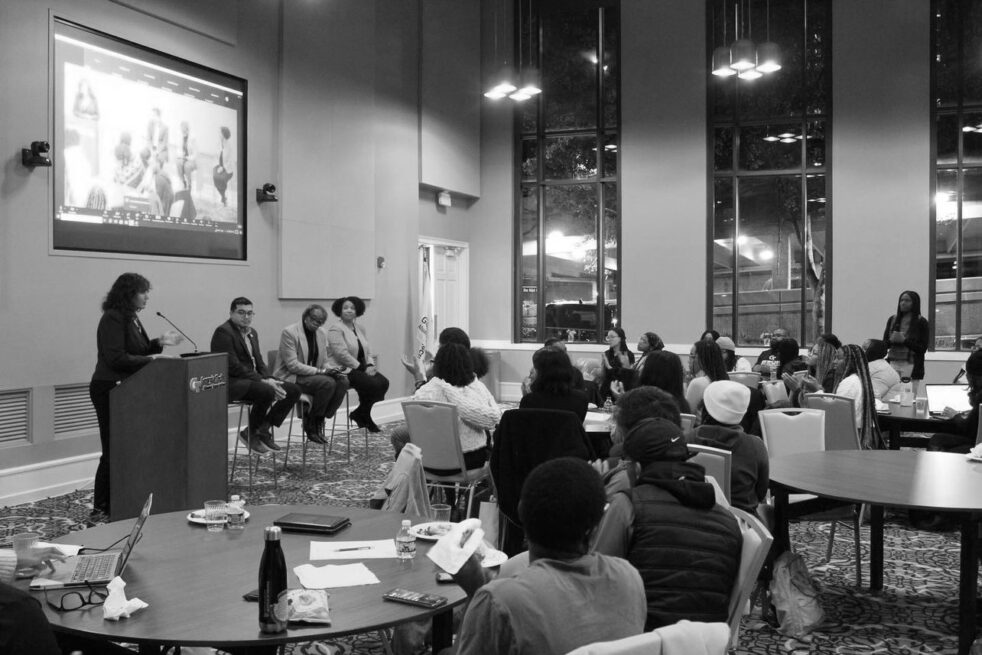The Organization for Social Activism (OSA), along with the Black Alumni Association, held a two-hour open forum for Under-Represented Groups in Education (U.R.G.E) on Wednesday, Nov. 1, 2023. The event was held at the Alumni House Ballroom and presented the opportunity for students and administration to discuss maintaining diversity, equity and inclusion (DEI) on Tech’s campus. The student-led panel covered numerous topics for the in-person and virtual attendees, including an overview of national policies, the changed role of race in college applications and a question/answer session.
Samatha Bolton, second-year BA and the founder and president of OSA, organized the event. The organization works closely with other organizations to raise awareness for various social issues through panels, demonstrations and forums. Recent events put on by OSA have included the Mental Health Speak-Out, an initiative focused on queer and women’s issues, volunteering at the Atlanta Community Food Bank, Trees Atlanta and Open-Mic Nights.
“Our goal is to stray away from the more radical extremism that gives activism a bad name, [and] especially on a campus like this, it’s important to know your audience,” Bolton said. “We try to recognize what people have going on, [and] we want to galvanize people, not anger them,” said Bolton.
Bolton and Adaiba Nwasike, fourth-year PUBP, opened up the U.R.G.E Open Forum and led the introductory session on affirmative action, an effort supported by procedures and policy allowing for increased opportunities for those from minority backgrounds. Affirmative action is most frequently used in and known for the role it plays in admissions but is also applied as a means of equity in the workplace.
Nwasike continued the discussion of affirmative action by sharing its history. In her presentation, she shared how affirmative action derived from the Equal Employment Opportunity Committee created by President John F. Kennedy in 1961, citing that 1961 was also the year the first Black student was accepted to the Institute.
However, in June of 2023, after hearing a case where Petitioner Students for Fair Admissions (SFFA) sued Harvard College over their admissions process, the Supreme Court found that Harvard admissions violated the Equal Protection Clause of the Fourteenth Amendment and struck it down in a 6-2 vote. Along with many other schools, Harvard admissions used race as one of the factors in the admissions process, and SFFA argued that this practice discriminated against Asian Americans in favor of white applicants.
“The immediate action is that institutions need to reevaluate current practices to ensure compliance with the law. This looks like taking or removing race from the application, but it’s important that universities note that race can still be discussed in other components of an application, especially if it affects their life story,” Nwasike said during the forum
The U.R.G.E. Forum then welcomed the next discussion with Tech administration members where speakers had the opportunity to discuss the relation of their roles to DEI in education and accept questions from students.
The panel hosted Dr. Shante Bolton, the Executive Vice President for Administration and Finance, and Chief Business Officer, Dr. Stephen McLaughlin, the Executive Vice President for Academic Affairs, and Rick Clark, the Associate Vice President of Enrollment Management and Executive Director of Undergraduate Admissions.
Dr. Bolton and Provost Mclaughlin led by discussing the creation of a strategic leadership team for DEI, which they hope to comprise members from various administrative and academic units, including students, faculty and staff.
They emphasized maintaining honest and transparent conversations with the Tech community and the importance of protecting the jobs of those building DEI programs at the Institute. This includes resource alignment, tailored solutions and responsibility/ownership.
“By integrating these things into the core work of what we do and how we do it every day. It improves tangible outcomes, things we can point to, things we can hold ourselves and others accountable to,” Dr. Bolton said.
Clark continued this discussion, noting Tech’s commitment to follow the Supreme Court directive related to affirmative action but emphasized the Institute’s commitment to nurturing a diverse student body and the community effort that is required.
The rest of the forum allowed students to ask questions to a broader administration panel built of diverse jobs and departments within and outside of the Institute.
Questions covered topics such as representation in the workplace, raising awareness for DEI programs like as the Office of Minority Educational Development and maintaining equity during the admissions process OSA hopes to host more open discussions about DEI on Tech’s campus to educate students on the effects of the affirmative action ruling and encourage student activism.
“This was about educating what affirmative action is and what’s going [on], it was about transparency, honesty and genuine discussion,” Bolton said. “We want to be equal in this conversation and galvanize people.”
